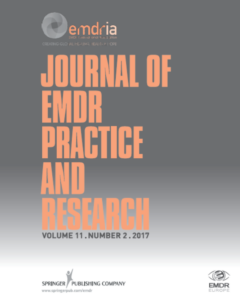The Network Balance Model of Trauma and Resolution—Level I: Large-Scale Neural Networks (Journal of EMDR Practice and Research)
The default mode network functions in autobiographical memory, self-oriented and social cognition, and imagining the future.
Read MoreEMDR Group Treatment of Children Refugees—A Field Study (Journal of EMDR Practice and Research)
The growth in refugees fleeing from persecution, terrorism, and war-torn countries, there is an urgent need for therapeutic interventions.
Read MoreIdéalisation et émotions positives inadaptées : thérapie EMDR pour femmes ambivalentes à l’idée de quitter un partenaire violent (Journal of EMDR Practice and Research)
Après avoir assuré leur sécurité, la prise en charge des victimes de violences d’un partenaire intime est généralement axée sur les …
Read MoreInterventions EMDR dans le traitement des addictions (Journal of EMDR Practice and Research)
La consommation de tabac, d’alcool et de drogues illicites est très répandue et a des conséquences négatives importantes pour les individus…
Read MoreWorld Trade Center: A longitudinal case study for treating post traumatic stress disorder with emotional freedom technique and eye movement desensitization and reprocessing (WORK)
A single subject design case study of a survivor of the Twin Towers collapse who was treated for prolonged PTSD complicated by dissociated memories with EFT and EMDR.
Read MoreFeasibility of EMDR for posttraumatic stress disorder in patients with personality disorders: a pilot study (European Journal of Psychotraumatology)
Changes in symptom severity of PTSD, dissociation, insomnia, self-harm, hallucinations in patients with personality disorders during EMDR.
Read MoreWorking with voices and dissociative parts: A trauma-informed approach (Instituto INTRA-TP, 2019)
Mosquera shows us how to maximize the presence of voices as the way to reach important clinical goals, including using EMDR.
Read MoreEMDR in der Behandlung eines gehörlosen PTBS-Patienten: Vorzüge einer nicht ausschließlich verbalen psychotherapeutischen Intervention – ein Fallbericht
EMDR in der Behandlung eines gehörlosen PTBS-Patienten: Vorzüge einer nicht ausschließlich verbalen psychotherapeutischen Intervention – ein Fallbericht [EMDR in the treatment of a deaf PTSD…
Read MoreTreating repetitive suicidal intrusions using eye movements: Study protocol for a multicenter randomized clinical trial (BMC Psychiatry)
Study aims to evaluate the effectiveness of an Eye Movement Dual Task (EMDT) intervention targeting suicidal imagery in depressed patients.
Read MoreNeurobiological correlates of EMDR therapy effect in PTSD (European Journal of Trauma & Dissociation)
Sixteen PTSD patients underwent fMRI during negative emotional face recognition task, before and after EMDR treatment.
Read MoreResponse to “Comparing the effectiveness of EMDR and TF-CBT for children and adolescents: A meta-analysis” (Journal of Child & Adolescent Trauma)
Brief report and response to previously published work “Comparing the effectiveness of EMDR and TF-CBT for children and adolescents: A meta-analysis.”
Read MoreThe effect of the eye movement desensitization and reprocessing intervention on anxiety and depression among patients undergoing hemodialysis: A randomized controlled trial (Perspectives in Psychiatric Care)
Nurses can use EMDR intervention in clinical practice with psychotropic drugs to reduce depression/anxiety in patients undergoing dialysis.
Read More



